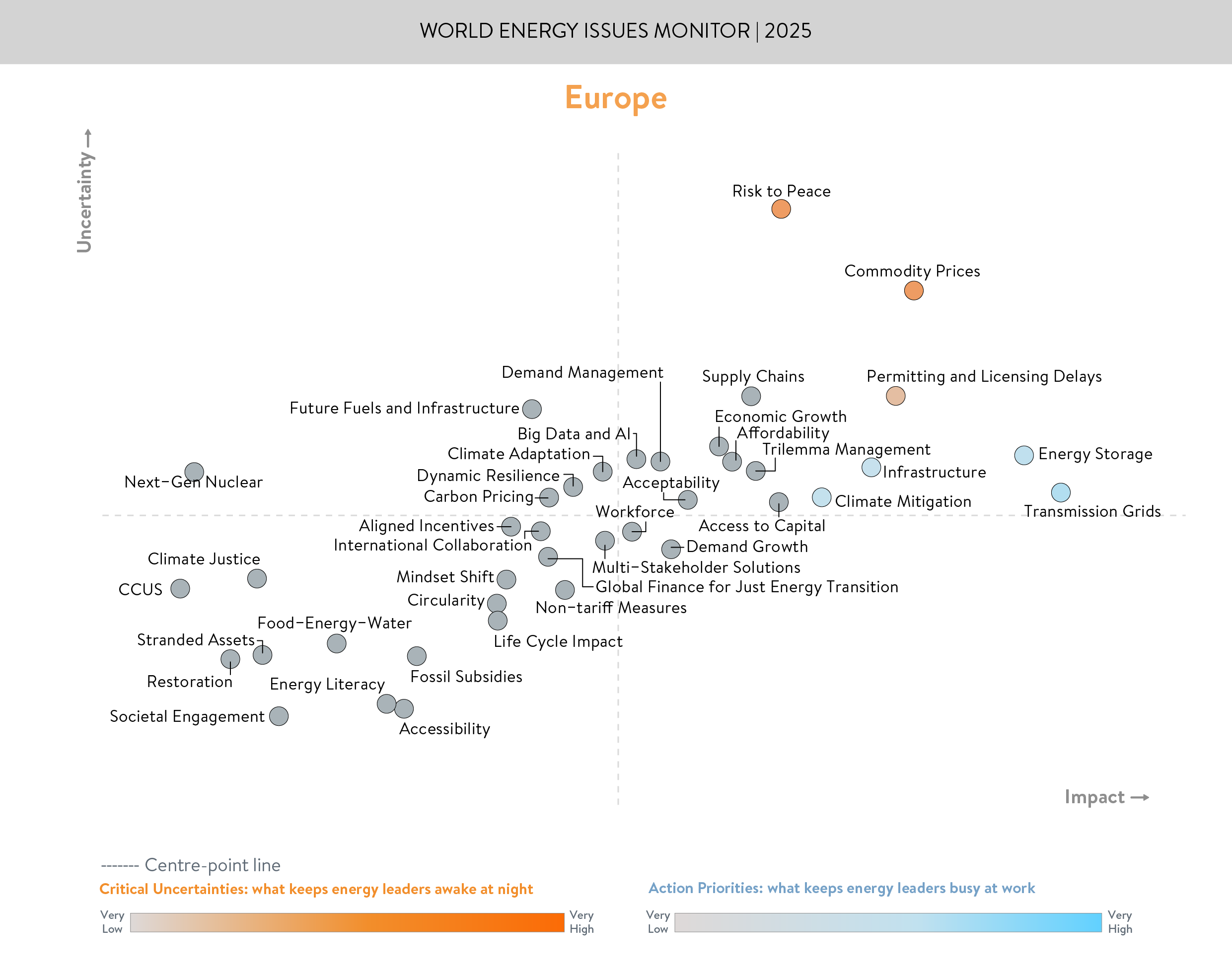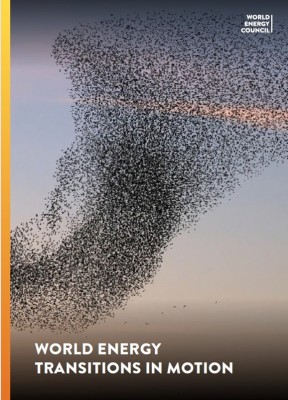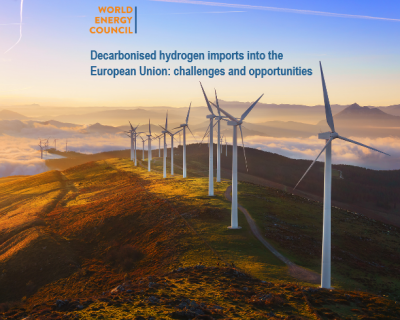Europe Network
The European regional network currently spans 30+ countries, from Iceland and Ireland in the West to Russia, Kazakhstan, Armenia, and Turkey in the East, including most European Union member countries. The large and diverse European regional community provides national Member Committees and their members with excellent opportunities to expand and deepen their network and engage around activities and events – from young energy professionals to CEO and Ministerial level – to drive action and achieve impact.
Regional action priorities that support the Council’s mission and humanising energy vision are agreed on an annual basis by national Member Committees in the framework of a Regional Action Plan. In 2021, European members joined forces to work on the Insights Briefing ‘Decarbonised Hydrogen Imports into the European Union: Challenges and Opportunities’ and formed a working group to activate the Council’s Humanising Energy vision in the region.
Each month, the European regional network meets to discuss matters of mutual interest, drive collective activities, and keep each other updated on relevant developments and events. In addition, throughout the year regionally targeted workshops are being organised to advance discussions in the context of our global insights and innovation tools.
Hydrogen has the potential to become the second main energy vector after electricity for the decarbonisation of energy consumption in end-use sectors. Its role in deep decarbonisation scenarios has been increasing in recent years, together with dedicated roadmaps and strategies that have been published in several countries. Under the guidance of a Steering Committee consisting of several European member committees, a study was undertaken by the European Network into Decarbonised Hydrogen Imports into the European Union: Challenges and Opportunities.
The Insights Briefing explores possible scenarios for consumption and production of decarbonised hydrogen in the European Union, in line with its net-zero greenhouse gas emissions goals. Cost estimates for the production and transportation of decarbonised hydrogen from various power sources are presented for several European and neighbouring countries, out to the 2030- and 2050-time horizons.
To access the recent hydrogen study, please click here.
Several European members formed a working group to engage stakeholders in the Humanising Energy conversation to:
- Raise awareness of the human and societal dimensions of the energy transition
- Exchange views, experiences and best practices on relevant topics related to Humanising Energy
- Enhance visibility of the Council and its national Member Committees in the region around this topic
In July 2021, a side-event to the Vienna Energy Forum was organised, focusing on the challenges and opportunities of Humanising Energy in Regional Energy Transitions. Participants discussed how to fairly manage the impacts on regions and societies of faster paced energy transitions and looked at how stakeholders can work together in the process to effectively join the dots between ‘races to zero’ and social justice agendas.
As part of World Energy Week LIVE 2021, a conversation focusing on Active energy citizens: At the heart of the energy transition was convened. Participants explored how to ensure that all citizens, communities, and societies – including the most vulnerable – are involved in a clean and just energy transition.
Several countries in the region have developed national Future Energy Leaders Programmes. Periodically, events are organised to bring together the broad Future Energy Leaders community in Europe as well as European FEL-100 to network and engage in conversations around various energy topics. Webinars organised in 2021 include ‘How to Boost Renewables to Meet the EU Climate Target?’ and ‘The Future of Natural gas in the Energy System – a European Perspective’.
Energy in Europe

INTRODUCTION
Europe’s energy transition is at a pivotal moment—navigating geopolitical disruptions, rising affordability pressures, and divergent national approaches to climate and energy policy. While the region remains a global leader in clean energy innovation, it must confront the realities of aging infrastructure, fluctuating commodity prices, and persistent public concern over cost and equity.
The 2025 World Energy Issues Monitor reveals a complex picture: strong momentum in renewable integration and digital grid upgrades in parts of Northern and Western Europe, contrasted with infrastructure and investment gaps in Southern and Eastern regions. Transmission grid expansion remains the region’s top action priority, while uncertainty around commodity prices—especially fossil fuels and critical minerals—continues to challenge long-term planning and energy security.
France has committed €100 billion to nuclear and grid expansion, reinforcing its low-carbon leadership. Germany is accelerating solar and offshore wind to reach 80% renewable electricity by 2030. In contrast, Eastern and Southern European nations continue to face investment barriers, affordability pressures, and permitting delays that slow progress. These divergences underscore the need for shared solutions across Europe’s fragmented energy landscape.
As Europe deepens cross-border collaboration and accelerates electrification across sectors, success will depend on its ability to maintain policy cohesion, address community concerns, and embed social equity into every stage of the transition. The task ahead is to sustain Europe’s energy leadership into an inclusive, resilient, and competitive advantage.
|
ABOUT THE WORLD ENERGY ISSUES MONITOR Energy transitions are complex, evolving, and deeply interconnected, shaped by shifting priorities, emerging uncertainties, and regional realities. Since 2009, the World Energy Issues Monitor has offered a unique lens into the dynamic forces driving energy transitions worldwide. This year’s survey spans 39 core transition issues across six categories – spotlighting blind spots, new signals, and shifting leadership priorities. Amid growing uncertainty, leaders across the World Energy Council community are asking sharper questions: What’s working? What can be adapted across regions? And where are the real opportunities to turn blind spots into bright spots?
NOTE ON TIMING AND CONTEXT The world Energy Issues Monitor was conducted between 24 November 2024 and 10 January 2025. The regional workshops that informed the commentary insights took place in the second half of February 2025, before the current trade tensions and the US-led trade tariffs. As such, the regional commentaries should be read in the context in which they were developed, prior to the escalation of current global trade dynamics. |
CRITICAL UNCERTAINTIES AND ACTION PRIORITIES
Top Critical Uncertainty: Commodity Prices
From the vantage point of Europe’s ambitious climate agenda, the rollercoaster of global commodity prices stands out as a significant disruptor. Despite leading the charge in renewables, Europe remains heavily reliant on imported fossil fuels and minerals. Spikes in gas or battery metal prices can derail clean tech investments, trigger emergency coal restarts, and disrupt policy cohesion as seen in 2022, when gas price volatility prompted coal plant restarts across parts of Central Europe.
- Fossil Import Reliance vs. Decarbonisation: While phasing out coal, some nations substitute with natural gas, exposing them to volatile global gas markets and sudden supply squeezes. This vulnerability hinders the region’s otherwise steady drive to cut carbon emissions.
- Critical Minerals Vulnerability: Europe’s high-tech energy aspirations—especially advanced battery manufacturing—demand secure and affordable metals like lithium, nickel, and cobalt. Rapidly fluctuating costs or potential supply chain bottlenecks can derail scale-up of key green technologies.
- Policy Fragmentation Under Pressure: In times of commodity shocks, EU countries often prioritise security measures such as reinstating coal plants or imposing price caps, which can weaken EU climate unity and deter long-term investment.
Top Action Priority: Transmission Grids
Modernising and linking European grids top the region’s daily agenda, cementing a path for deep electrification while facilitating cross-border power exchanges. Although not free of complexities, infrastructure updates have clearer technical roadmaps than other uncertainties.
- Offshore Wind Integration: Large-scale developments in coastal waters demand new high-voltage networks to deliver power from turbines at sea to inland load centres. Although local community and environmental reviews can prolong timelines, the core engineering solutions are well established.
- Interconnection & Market Integration: Enhancing cross-border lines in places like Northern and Eastern Europe can reduce consumer costs and bolster resilience. Projects advanced under REPowerEU highlight the tangible wins of collaborative TSO planning.
- Permitting Delays: Despite the impetus for faster green infrastructure, complex bureaucracy for permitting licenses and community resistance can stall or reshape proposed line routes. Early stakeholder engagement—an emerging best practice in some countries—helps maintain social licence while keeping expansions on schedule.
|
Energy-Cyber Nexus – AI and Grid Resilience in Europe
|
BLINDSPOTS AND BRIGHTSPOTS
Energy transitions across Europe are boosting low-carbon growth in several countries, yet the overall path to deep system-wide decarbonisation continues to be slowed by geopolitical disruptions, permitting delays, and societal acceptance issues. The 2025 data reveals:
Blind Spots
- Societal Engagement & Community Acceptance
Protests over rising power bills in Europe highlight the need for stronger community involvement in energy transition planning. Targeted outreach and education are essential to ensure local populations understand the benefits, costs, and trade-offs of new infrastructure. By actively engaging communities—including younger generations through schools and youth programs—stakeholders can foster trust, build energy literacy, and support inclusive decision-making processes that accelerate climate goals.
- Accessibility Gaps
Even with strong policy frameworks, some parts of Eastern and Southern Europe still lack modern infrastructure. Rising power prices risk deepening energy poverty if affordability mechanisms and infrastructure investment aren't deployed at scale. Closing this divide is essential to achieving a unified and just transition.
- Anticipating the Power Demand Tsunami
Europe’s transition efforts have focused heavily on expanding renewable supply, but growing electricity demand is emerging as a critical blind spot. A surge in consumption is projected from AI data centres, electric mobility, green hydrogen production, and industrial reshoring—what some are calling a “power demand tsunami.”
Without more integrated planning across supply, infrastructure, and demand-side response, this surge could outpace the region’s grid resilience and compromise energy security. The challenge is especially acute in countries still recovering from the dual shocks of energy price volatility and geopolitical disruption. Permitting reform alone won’t solve it—anticipatory and coordinated planning is now essential.
Bright Spots
Despite differing starting points, several countries are making headway by aligning industrial strategy with grid upgrades and innovation.
- France's Transmission Grid and Nuclear Strategy
France announced a €100 billion investment to modernise its transmission grid and expand nuclear capacity. France is reinforcing its position as a domestic and regional low-carbon electricity leader, targeting AI and industrial consumers.
- Germany: Advancing a National Hydrogen Backbone
Germany is making decisive progress on green hydrogen, with a 10,000 km hydrogen backbone network approved and partially under construction. This infrastructure aims to connect industrial clusters and import hubs, supporting the scale-up of domestic production and future imports while reinforcing Germany’s long-term decarbonisation strategy.
- Turkey’s Solar and Wind Manufacturing Leadership
Turkey now leads Europe in solar panel manufacturing and a growing player in wind energy. Localised supply chains are reducing dependency on imports and strengthening resilience.
- Austria: On Track for 100% Renewable Electricity by 2030
Austria is successfully advancing toward its target of achieving 100% renewable electricity by 2030. Strong national coordination, hydropower expansion, and support for solar and wind are helping accelerate the transition, positioning Austria as a frontrunner in Europe’s clean power shift.
- European Union's Green Transition and Innovation Strategy
The EU is focusing on closing innovation gaps and accelerating clean energy adoption, with a goal to lead in clean technologies by 2030. Initiatives like the Competitiveness Compass and cross-border collaborations aim to enhance energy security and decarbonise industrial sectors.
CONCLUSION
Just as observing a flock of birds in flight can reveal emergent patterns, Europe’s energy landscape highlights both decisive advances and slower, more fragmented processes. This interplay underscores several key insights:
- Uncertainty around Commodity Prices underscores Europe’s reliance on imported fuels and minerals, leaving it vulnerable to market volatility that can disrupt long-term decarbonisation plans.
- Transmission Grids remain the top action priority, offering a clearer technical roadmap for electrification and regional integration, despite national policy differences and local permitting delays.
- Blind Spots – including societal engagement, rising electricity demand, and uneven infrastructure – risk slowing even the most well-designed initiatives. Stronger planning, communication, and equitable investment are essential.
- Bright Spots – such as France’s nuclear and grid upgrades, Germany’s progress on green hydrogen, Turkey’s solar manufacturing ecosystem and Austria’s grid decarbonisation – show how targeted policies and coordinated efforts can transform local energy landscapes and deliver tangible climate gains.
Guided by robust strategies like the Competitiveness Compass and cross-border infrastructure collaborations, Europe can continue evolving as a strategic player in energy transitions. The region’s future success relies on bridging policy fragmentation, expanding global stakeholder engagement, and accelerating both infrastructure and demand-side measures in pursuit of a Trilemma-balanced energy future.
KEY CONTRIBUTORS:
In addition to thanking experts from across our community for their contributions, we would like to make special mention of Olga Bogdanova, Deputy State Secretary, Ministry of Climate and Energy, Latvia and Chair of the World Energy Council Latvia Member Committee; Marie-Line Vaiani, Secretary General of the World Energy Council France Member Committee and Editor-in-Chief of La Revue de l’Énergie; Kıvanç Zaimler, President of Sabancı Holding Energy Group and Chair of the World Energy Council Türkiye Member Committee; Gerhard Gamperl, Director at VERBUND AG and Secretary General of the World Energy Council Austria Member Committee.
Downloads

World Energy Issues Monitor 2025
Download PDF
World Energy Issues Monitor 2025 - Europe Regional Commentary
Download PDF
Decarbonised hydrogen imports into the European Union: challenges and opportunities
Download PDF
Phasing Out Carbon - How to decarbonise North-Western Europe's energy mix in the run-up to 2050
Download PDF






